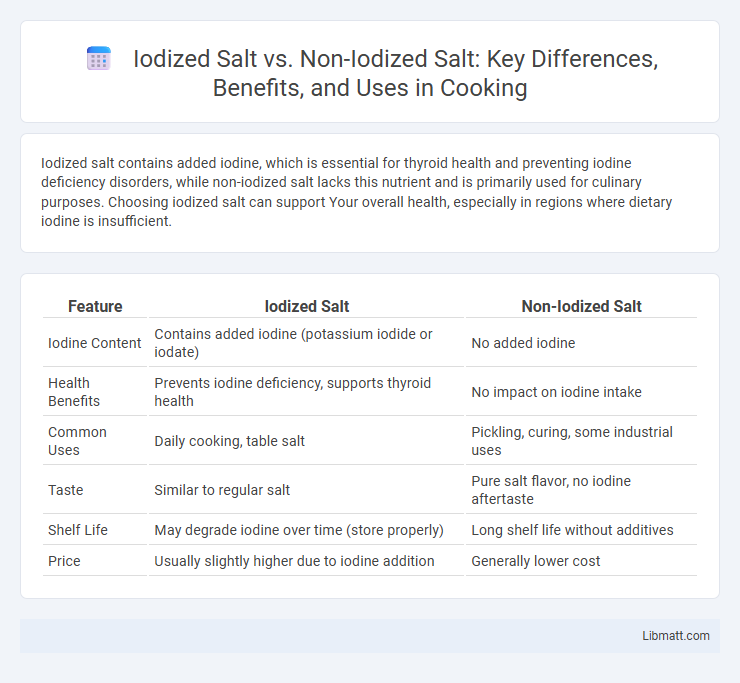Iodized salt contains added iodine, which is essential for thyroid health and preventing iodine deficiency disorders, while non-iodized salt lacks this nutrient and is primarily used for culinary purposes. Choosing iodized salt can support Your overall health, especially in regions where dietary iodine is insufficient.
Table of Comparison
| Feature | Iodized Salt | Non-Iodized Salt |
|---|---|---|
| Iodine Content | Contains added iodine (potassium iodide or iodate) | No added iodine |
| Health Benefits | Prevents iodine deficiency, supports thyroid health | No impact on iodine intake |
| Common Uses | Daily cooking, table salt | Pickling, curing, some industrial uses |
| Taste | Similar to regular salt | Pure salt flavor, no iodine aftertaste |
| Shelf Life | May degrade iodine over time (store properly) | Long shelf life without additives |
| Price | Usually slightly higher due to iodine addition | Generally lower cost |
Introduction to Iodized and Non-Iodized Salt
Iodized salt is table salt fortified with iodine, an essential nutrient that helps prevent iodine deficiency disorders such as goiter and hypothyroidism. Non-iodized salt lacks this additive and is often preferred for culinary purposes where iodine flavor or reaction is not desired. Choosing between iodized and non-iodized salt depends on dietary needs, public health guidelines, and specific cooking applications.
What is Iodized Salt?
Iodized salt is table salt fortified with iodine, an essential mineral that supports thyroid function and prevents iodine deficiency disorders such as goiter and hypothyroidism. This type of salt helps maintain your body's iodine levels, which is crucial for metabolic processes and overall health. Choosing iodized salt ensures you receive adequate iodine intake, especially in regions where natural dietary sources are limited.
What is Non-Iodized Salt?
Non-iodized salt is pure sodium chloride without the addition of iodine, commonly used in food preservation, pickling, and some industrial applications where iodine is unnecessary or undesirable. It retains its natural mineral content and lacks the anti-caking agents often added to iodized varieties. Non-iodized salt is preferred for baking and culinary uses where iodine's metallic taste might alter the flavor profile.
Key Nutritional Differences
Iodized salt contains added iodine, an essential nutrient that supports thyroid function and prevents iodine deficiency disorders, whereas non-iodized salt lacks this fortification. You can improve your dietary iodine intake significantly by using iodized salt, especially in regions where iodine deficiency is prevalent. Both salts provide similar amounts of sodium, but iodized salt offers the additional health benefit of iodine supplementation.
Health Benefits of Iodized Salt
Iodized salt is fortified with essential iodine, a trace element crucial for thyroid hormone production, which regulates metabolism, growth, and development. Regular consumption of iodized salt helps prevent iodine deficiency disorders such as goiter, hypothyroidism, and cognitive impairments. Health organizations recommend iodized salt as a simple, cost-effective strategy to ensure adequate iodine intake across populations.
When to Use Non-Iodized Salt
Non-iodized salt is ideal for recipes where the pure flavor of salt is essential, such as in baking or pickling, because it lacks the slight chemical taste iodine can impart. It is preferred in canning and fermenting to avoid reactions that may alter color or texture of the preserved foods. Non-iodized salt is also suitable for individuals with iodine sensitivities or those following specific dietary restrictions.
Culinary Uses: Taste and Texture Comparison
Iodized salt offers a slightly sharper, more pronounced flavor compared to non-iodized salt, making it ideal for seasoning where saltiness is a key component. Non-iodized salt, often preferred in baking and delicate dishes, provides a purer, less metallic taste that preserves subtle flavors and textures. The finer grain of table iodized salt dissolves quickly, while kosher and sea salts--usually non-iodized--offer a coarser texture valued for crust formation and finishing touches.
Iodine Deficiency: Risks and Signs
Iodized salt is fortified with iodine, a crucial nutrient that prevents iodine deficiency, which can lead to serious health issues such as goiter, hypothyroidism, and developmental delays in children. Non-iodized salt lacks this essential element, increasing the risk of iodine deficiency disorders, especially in regions with low dietary iodine intake. Early signs of iodine deficiency include fatigue, weight gain, cold intolerance, and swelling in the neck due to thyroid gland enlargement.
Choosing the Right Salt for Your Needs
Iodized salt contains added iodine, essential for preventing thyroid disorders and promoting overall health, making it ideal for daily dietary use. Non-iodized salt, lacking this nutrient, is preferred in culinary applications where iodine could affect flavor or for those using specialized diets. Selecting the right salt depends on your health requirements and cooking preferences, ensuring optimal nutritional benefits and taste.
Conclusion: Which Salt Should You Choose?
Choosing iodized salt is essential for preventing iodine deficiency disorders and supporting thyroid health, especially in areas where iodine intake from food is limited. Non-iodized salt may be preferred for culinary purposes where iodine's slight taste could interfere, but it lacks the critical nutrient for overall wellness. Your best choice depends on balancing dietary iodine needs with flavor preferences, making iodized salt the recommended option for most individuals.
Iodized Salt vs Non-Iodized Salt Infographic

 libmatt.com
libmatt.com